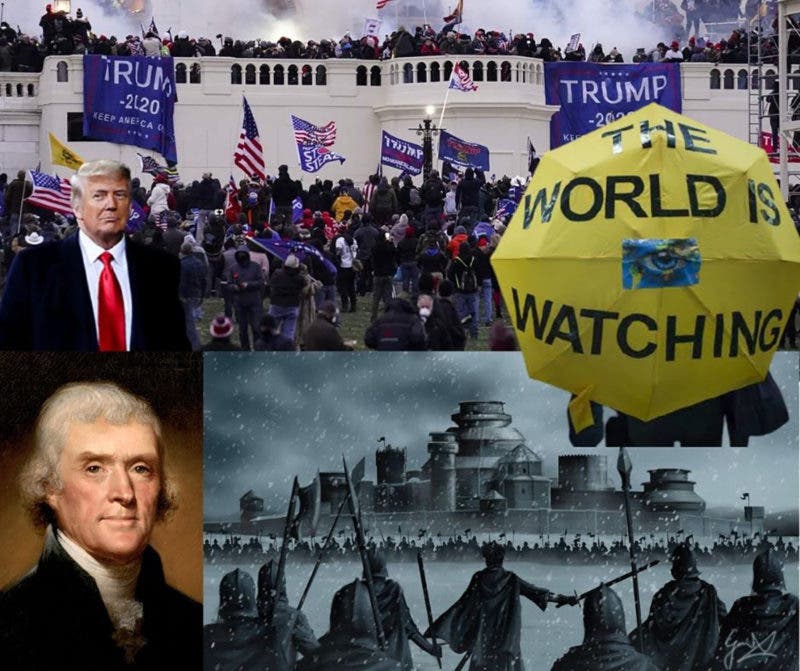America first or Trump first, US civil war?

An unnerving and a spellbinding live spectacle of Washington’s Capitol, symbolic and actual seat of power of the world’s most powerful country, being overrun by thousands as a new president was about to be declared, held the world in shock this past week. Protestors crossed lines set by the National Guard, smashed windows, ransacked offices and tried to forcibly enter the main chamber where the congressmen and staff had to lay on the ground breathless as security blocked doors with furniture and had their pistols out and ready.
A scene much like the fall of governments and empires, much like the movies showing revolutionaries or barbarian invaders overrunning Rome as it burned or Paris in the French Revolution. Much like the battle for Winterfell in “Game of Thrones.” “Like” but not quite the same because there was no burning, battles and killing, looting of an actual empire falling… chaotic scenes. But not true chaos though; so, in a sense, it was relatively “peaceful” as some protestors would call it, and reporters and writers would refute.


The greater spectacle, though not visually as dramatic, was sitting US President Trump calling on his followers to march on the Capitol, and former New York mayor Rudy Giuliani excitedly calling for “Trial by Combat!” Trump was calling for such an opposition rally for weeks, and followers had been discussing the planned uprising of January 6 for days already on social media, and the large rally just before the march was a walking distance away from the Capitol.
Amazing to many then was why was the National Guard so undermanned, unprepared and restrained in dealing with the crowds? Especially when they so aggressively pushed away, hit, gassed peaceful protesters against the murders of blacks in St. John’s Church. Many pundits and analysts attributed it, rightly or not, to bias for white constituents.
What events clearly showed were the deep divisions of race, class and politics in the US. Although losing to Biden’s 81 million, Trump had even more individual votes, 74 million this 2020 elections, than the 63 million he had in 2016 (Obama had 65.9 million votes in 2012)! This voter base didn’t care that under Trump, ignoring his top scientists, the US is suffering the highest Covid-19 death rates in the world at over 360,000. That Trump antagonized many US allies, his own Cabinet and intelligence officials, protected apparently gratuitous killings of blacks. It didn’t matter that the president was widely accused of conflicts of interest, taped trying to overturn election results, that there were massive media campaigns against him, that his actions may have undermined many fundamental institutions of the US, or that he made comments against women, Muslims, immigrants, etc.
The core takeaway in politics was that performance, consistency, rationality or whether the leadership unified or divided the country, did not matter at all to a core of some 45 percent of US voters. This was a voter block to be courted, not angered by politicians, so much so that many US politicians unhappy with the conduct of affairs did not speak up. These traits, can therefore, could not be expected or relied upon by the rest of the world when dealing with the US — for now.
Trump raising over $200 million in just two months to oppose election results that dozens of US courts have already upheld as substantially clean shows that it is not just the Midwest less-educated white that is part of this core, but also a rich and powerful constituency perhaps bent on keeping its privileges and immunities from prosecutions.
The US may be having problems, but it is clearly not those of a falling empire. Yes, there are the clear biases and injustices against sectors and nations. But we are also witnessing a core of peoples standing up based on values that can hold up the aspirations of a nation, beyond the volatilities of politics. US Pentagon chiefs and military officers came out to denounce events and even their own still-sitting president; this is an institution that has shown itself to have avoided domestic partisan politics or publicity. The Cabinet secretaries and the staff of Trump himself resigning in numbers; the justices who ruled against Trump’s case although he appointed them; legislators considering removing Trump from office, while others cautioning that given the time left, such a drama is no longer necessary; and the eventual defusing of the situation with restraint, without much actual violence — these all point to a fundamental stability still existing in US society and systems.
The US still has deep foundations for a strong, leading nation. It still has many of the most diverse, innovative tech, science, financial minds and entrepreneurs in the world, rewards systems for them. It still has an efficient (not necessarily well prioritized) ecosystem for execution of finance and projects, powerful worldwide media platforms and communications systems. It still has the best marketers in the world, and many truly hardworking people.
But will these strengths keep sustaining US primacy in coming years? It depends. Nations do not stay ahead by a few geniuses; a critical mass of talent and a generally productive average population are needed. Fundamental weaknesses need to be addressed: A pleasure and entitlement-focused society without a balancing sense of required effort and responsibility. A low savings rate, which leads to low investment capacity if without the use of excessive debt. A reliance on debt and printing of money instead of budgeting that requires low interest rates and causes economic misallocations. A budget more for military adventures and political causes rather than infrastructure. An education system run more as a business, too costly, unprioritized for the average person.
The model of maximizing profits all the time, e.g., investing mostly in the higher profits from social and software apps rather than having manufacturing and labor skills development as concurrent goals, will create large income, tech and social gaps. This will cause international economic, tech imbalances that the US will try to blame on others. Cost structures will grow higher and productivity, lower. This can work only for the tech-focused sector and will leave large sectors of the population to ever-declining incomes. It also makes international production and consumption pipelines crucial to be linked together to the extent that nations may go to war to protect or to damage these links beyond their borders.
These directions are a formula for rising instability, especially if the resolution methods are adversarial, excessively competitive.
Do not plant the seeds of hate, as the events in World War 1 led to World War 2, and ancient and colonial histories of repeated injustices have led to generations of grudges, decades of war. Coerced politics in other countries have planted deep-seated, perhaps justified suspicions. But these have been solved, overcome before. Knots are untied by loosening, not by pulling tighter; angers are turned into friendships by increased interactions, not less. Like businesses and sciences that improve through iterations, these calibrations toward a world living together can be achieved better by recognizing facts, logic, history and stepping closer to each other rather than taunting and armed intervention.
Today, the world may not want to rely on America, but still looks to the US for this leadership. The Capitol siege or any presidency or events do not solely or permanently define the US or any other nation. Americans and Filipinos should not define others in simplistic, single-period terms, and hopefully the Biden administration will recalibrate toward more productive and peaceful relations with all countries.
***
RSVP first webinar in 2021! Updates of developments on the economic front, the obstacles and opportunities in PH-CN Relations bit.ly/2021phch
George Siy is a Wharton-educated industrialist, international trade practitioner and negotiator, director of the Integrated Development Studies Institute (IDSI).
New Worlds by IDSI aims to present frameworks based on a balance of economic theory, historical realities, ground success in real business and communities and attempt for common good, culture and spirituality.



















![[Book Review] The Blade Itself (The First Law Trilogy) by Joe Abercrombie](https://bendthekneegot.com/wp-content/uploads/2018/01/1516047103_maxresdefault-218x150.jpg)
















